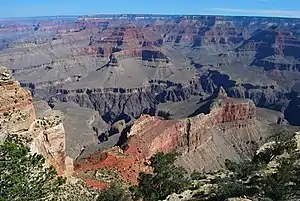Dana Butte
Dana Butte is a 4,964-foot (1,513 m) prominence, (named for geologist and volcanologist James Dwight Dana), adjacent the course of the Colorado River, in the Grand Canyon and sits on the south side of Granite Gorge. The butte is roughly 2.5 miles (4.0 km) north-northwest of Grand Canyon Village of the central Grand Canyon, and lies about 2.0 miles (3.2 km) due north of Pima Point (South Rim).
| Dana Butte | |
|---|---|
 | |
| Highest point | |
| Elevation | 4,964 ft (1,513 m) [1] |
| Prominence | 300 ft (91 m) |
| Parent peak | Hopi Point (South Rim) |
| Isolation | 2 |
| Coordinates | 36.0913715°N 112.1504478°W |
| Geography | |
 Dana Butte | |
| Location | Grand Canyon Coconino County, Arizona. U.S. |
| Topo map | USPS Grand Canyon |
| Geology | |
| Age of rock | Pennsylvanian |
| Mountain type | sedimentary rock: |
| Type of rock | Manakacha Formation Watahomigi Formation Redwall Limestone Tonto Group _3-Muav Limestone _2-Bright Angel Shale _1-Tapeats Sandstone Vishnu Basement Rocks Granitic (Xg).[2] Metamorphic Rocks (Xm)[3] |
The butte lies at the end of a higher elevation bright-red, very narrow Supai Group ridgeline, and the spire of Dana Butte sits on the cliff-former Redwall Limestone that creates not only massive cliffs, but platforms that support younger rock units above. Dana Butte's prominence spire is dull gray, sitting on gray debris on the platform, and is composed of weathered Supai Group Manakacha Formation, also a cliff-former rock. Dana Butte drains west into the Salt Creek (Grand Canyon) drainage, and east into the adjacent canyon of the terminus of Salt Creek.
See also
References
| Wikimedia Commons has media related to Dana Butte. |
- Topozone: Dana Butte, 4,964 ft
- “Geologic Map of the Grand Canyon in the Vicinity of the South Rim Visitor Center”, Kamilli, R. J., and Richard, S. M., editors, 1998. Geologic Highway Map of Arizona: Tucson, Arizona Geological Society and Arizona Geological Survey, 1 sheet containing text and figures, scale 1:1,000,000.
- “Geologic Map of the Grand Canyon in the Vicinity of the South Rim Visitor Center”.